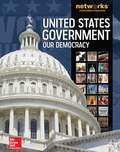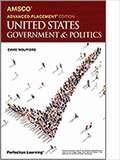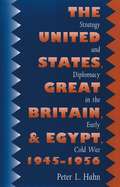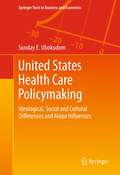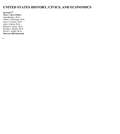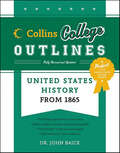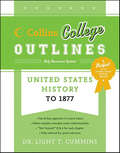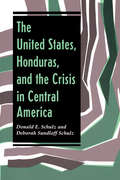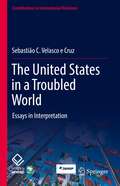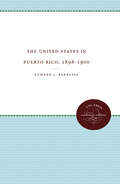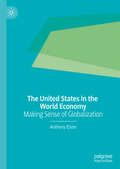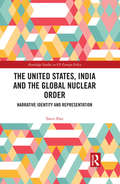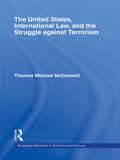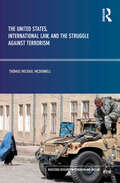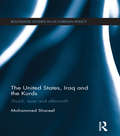- Table View
- List View
United States Government, Democracy in Action
by Richard C. RemyThis book provides a "behind-the-scenes" look at Washington never before available.
United States Government Our Democracy
by Richard C. Remy Donald A. RitchieUnited States government textbook
United States Government: Our Democracy
by Richard C. Remy Donald A. Ritchie Lee ArbetmanNIMAC-sourced textbook
The United States, Great Britain, and Egypt, 1945-1956
by Peter L. HahnEgypt figured prominently in United States policy in the Middle East after World War II because of its strategic, political, and economic importance. Peter Hahn explores the triangular relationship between the United States, Great Britain, and Egypt in order to analyze the justifications and implications of American policy in the region and within the context of a broader Cold War strategy.This work is the first comprehensive scholarly account of relations between those countries during this period. Hahn shows how the United States sought to establish stability in Egypt and the Middle East to preserve Western interests, deny the resources of the region to the Soviet Union, and prevent the outbreak of war. He demonstrates that American officials' desire to recognize Egyptian nationalistic aspirations was constrained by their strategic imperatives in the Middle East and by the demands of the Anglo-American alliance.Using many recently declassified American and British political and military documents, Hahn offers a comprehensive view of the intricacies of alliance diplomacy and multilateral relations. He sketches the United States' growing involvement in Egyptian affairs and its accumulation of commitments to Middle East security and stability and shows that these events paralleled the decline of British influence in the region.Hahn identifies the individuals and agencies that formulated American policy toward Egypt and discusses the influence of domestic and international issues on the direction of policy. He also explains and analyzes the tactics devised by American officials to advance their interests in Egypt, judging their soundness and success.
United States Health Care Policymaking
by Sunday E. UbokudomHealth care is a very important component of the American economy. The United States Centers for Medicare and Medicaid Services (CMS) put the 2008 direct health care expenditures at about $2.34 trillion, or about 16.2 percent of the nation's gross domestic product (GDP), or an average of $7,681 spent for every man, woman, and child in the country. Health care cost increases have caused very serious problems that threaten to bankrupt the system, providers, employers, and the families that pay the costs that their health insurance plans do not cover. Additionally, cost increases have reduced access to health care services, adversely affected the quality of care, and resulted in avoidable illnesses, premature deaths, and in health disparities based on race, ethnicity, and income. Consequently, health care reform has continuously been on the public and governmental agendas. It is out of this environment that several reform plans, including the 1993 Health Security Act, and the 2010 Patient Protection and Affordable Care Act (PPACA), were launched. This book examines the ideological, social, cultural, economic, and several other factors that dictate the various measures and approaches employed to tackle the perceived problems. The book has an index, tables, charts and figures, lists of major terms, and review questions for each chapter. This book will appeal to students in Master of Health Administration (MHA), Master of Public Health (MPH), Master of Public Administration (MPA), Master of Science in Nursing (MSN), health certificate programs, and junior and senior level undergraduate students in political science, public administration, public health, and public policy. In addition to serving as a core text for health policy and administration classes, the book will serve as a supplementary text for graduate level courses.
United States History and Government
by Joyce Appleby Alan Brinkley Albert S. Broussard James M. McPherson Donald A. RitchieNIMAC-sourced textbook
United States History and Government
by Bonnie-Anne Briggs Catherine Fish-PetersonNIMAC-sourced textbook
United States History and Government (Prentice Hall Brief Review)
by Bonnie-Anne Briggs Catherine Fish PetersenNIMAC-sourced textbook
United States History and Government (Prentice Hall Brief Review)
by Bonnie-Anna Briggs Catherine Fish PetersenTest-taking skills required for Regents Examination
United States History, Civics, and Economics
by Brinkley Broussard Clayton Patrick Remy Ritchie SaffellUnited States History, Civics, and Economics
United States History from 1865 (Collins College Outlines)
by John Baick Arnold M. RiceThe Collins College Outline for United States History from 1865 follows the key moments and players in American history from the Civil War Reconstruction period to the record high gas prices and low presidential poll numbers of 2006, with information on politics, disasters, crimes and scandals, social issues, pop culture, and more. This guide also contains appendixes on the territorial expansion and admission of states into the Union, the population of the United States, and a timeline of presidents and secretaries of state. Completely revised and updated by Dr. John Baick, this book includes a test yourself section with answers and complete explanations at the end of each chapter. Also included are bibliographies for further reading, as well as numerous vocabulary lists, exercises, and examples.The Collins College Outlines are a completely revised, in-depth series of study guides for all areas of study, including the Humanities, Social Sciences, Mathematics, Science, Language, History, and Business. Featuring the most up-to-date information, each book is written by a seasoned professor in the field and focuses on a simplified and general overview of the subject for college students and, where appropriate, Advanced Placement students. Each Collins College Outline is fully integrated with the major curriculum for its subject and is a perfect supplement for any standard textbook.
United States History to 1877 (Collins College Outlines)
by Light Cummins Arnold RiceThe Collins College Outline for United States History to 1877 starts with the founding of the country and continues through the Civil War and Reconstruion. The colonial era, the constitutional convention and founding of the American system of government, the beginning and rise of the Supreme Court, and many more monumental events in the early era of the United States are also covered. Completely revised and updated by Dr. Light T. Cummins, United States History to 1877 includes a test yourself seion with answers and complete explanations at the end of each chapter. Also included are bibliographies for further reading, as well as numerous maps, timelines, and illustrations.The Collins College Outlines are a completely revised, in-depth series of study guides for all areas of study, including the Humanities, Social Sciences, Mathematics, Science, Language, History, and Business. Featuring the most up-to-date information, each book is written by a seasoned professor in the field and focuses on a simplified and general overview of the subje for college students and, where appropriate, Advanced Placement students. Each Collins College Outline is fully integrated with the major curriculum for its subje and is a perfe supplement for any standard textbook.
United States History to 1877 (TEKS)
by Joyce Appleby Alan Brinkley Albert S. Broussard James M. Mcpherson Donald A. Ritchie8th grade US history textbook
The United States, Honduras, And The Crisis In Central America (Thematic Studies In Latin America Ser.)
by Deborah Sundloff SchulzPrior to the 1980s Honduras was an obscure backwater, of little public or policy concern in the United States. With the advent of the Reagan administration, however, Honduras became a launching pad for the administration's contra was against the Sandinista government in Nicaragua and for counterinsurgency operations in El Salvador. Placing events in the context of Honduran history, the authors provide a fascinating account of Honduran domestic politics and of the personalities, motives, and maneuvers of policymakers on both sides of the U.S.-Honduras relationship-- too often a tale of intrigue, violence, and corruption.
The United States in a Troubled World: Essays in Interpretation (Contributions to International Relations)
by Sebastião C. Velasco e CruzThis book presents an overview of the main changes in the United States' foreign policy in response to the transformations in the international order in the last decades. If, after the end of the Cold War, the USA invested in the universalization of market economy and in the strengthening of its military supremacy, new developments demanded reorientations in the country’s foreign strategy. The controversial military interventions in Afghanistan and Iraq, the 2008 economic crisis, the rise of the BRICs (Brazil, Russia, India and China) and the rise of right-wing populism altered the global political landscape and demanded new responses from the most powerful country in the world. This volume brings together nine essays in which the founding member of the World International Studies Committee, Sebastião C. Velasco e Cruz, analyzes how the United States’ foreign policy responded to the growing challenges posed by this changing international order, discussing topics such as: The evolution of the American geopolitical strategy after the end of the Cold War How US foreign policy reacted to challenges to security and dilemmas of the international orderBarack Obama's foreign policy and world politicsDonald Trump and the rise of populism in the USA US relations with BRICs and Latin America The United States in a Troubled World: Essays on Interpretation will be of interest to international relations and political science researchers both within and outside the United States.
The United States in a Warming World
by Thomas L. BrewerAddressing the widespread desire to better understand how climate change issues are addressed in the United States, this book provides an unparalleled analysis of features of the US economic and political system that are essential to understanding its responses to climate change. The introductory chapter presents a firm historical context, with the remainder of the book offering balanced and factual discussions of government, business and public responses to issues of energy policies, congressional activity on climate change, and US government involvement in international conferences. Abundant statistical evidence illustrates key concepts and supports analytic themes such as market failures, free riders, and the benefits and costs of alternative courses of action among industry sectors and geographic areas within the US. Written for audiences both outside and within the US, this accessible book is essential reading for anyone interested in climate change, energy, sustainable development or related issues around the world.
The United States in Puerto Rico, 1898-1900
by Edward J. BerbusseThrough a close examination of the United States military governments established in Puerto Rico, and with careful attention to the important Foraker Act of 1900, the author presents in detail the results of Puerto Rico's transition from the old world to the new.Originally published in 1966.A UNC Press Enduring Edition -- UNC Press Enduring Editions use the latest in digital technology to make available again books from our distinguished backlist that were previously out of print. These editions are published unaltered from the original, and are presented in affordable paperback formats, bringing readers both historical and cultural value.
The United States in the World Economy: Making Sense of Globalization
by Anthony ElsonThis book assesses the impact of globalization on the US economy from the perspective of international trade, finance, and immigration, with a view to eliminating misinformation in the current public debate about the costs and benefits of globalization. The United States has played a key role in the development of economic and financial globalization since the end of World War II and has been the largest force for integration of the global economy. While the US economy as a whole has been a net beneficiary from globalization, significant costs have been incurred by certain groups and communities as a result of its effects. This book evaluates the benefits, costs, and impact on income distribution for the United States in the areas of international trade, finance, and immigration, drawing on key findings of the relevant literature. A key argument of this book is that the US economy has been a significant net beneficiary from globalization, but that the government needs to do more for those workers negatively impacted by its effects. This book ends by proposing key institutional reforms at the national and international level that would foster further gains from globalization and create a more equal distribution of its benefits.
The United States, India and the Global Nuclear Order: Narrative Identity and Representation (Routledge Studies in US Foreign Policy)
by Tanvi PateIn the Post-Cold War era, US nuclear foreign policies towards India witnessed a major turnaround as a demand for ‘cap, reduce, eliminate’ under the Clinton administration was replaced by the implementation of the historic ‘civil nuclear deal’ in 2008 by Bush, a policy which continued under Obama’s administration. This book addresses the change in US nuclear foreign policy by focusing on three core categories of identity, inequality, and great power narratives. Building upon the theoretical paradigm of critical constructivism, the concept of the ‘state’ is problematised by focusing on identity-related questions arguing that the ‘state’ becomes a constructed entity standing as valid only within relations of identity and difference. Focusing on postcolonial principles, Pate argues that imperialism as an organising principle of identity/difference enables us to understand how difference was maintained in unequal terms through US nuclear foreign policy. This manifested in five great power narratives constructed around peace and justice; India-Pakistan deterrence; democracy; economic progress; and scientific development. Identities of ‘race’, ‘political economy’, and ‘gender’, in terms of ‘radical otherness’ and ‘otherness’ were recurrently utilised through these narratives to maintain a difference enabling the respective administrations to maintain ‘US’ identity as a progressive and developed western nation, intrinsically justifying the US role as an arbiter of the global nuclear order. A useful work for scholars researching identity construction and US foreign and security policies, US-India bilateral nuclear relations, South Asian nuclear politics, critical security, and postcolonial studies.
The United States, International Law, and the Struggle against Terrorism (Routledge Research in Terrorism and the Law)
by Thomas McDonnellThis book discusses the critical legal issues raised by the US responses to the terrorist threat, analyzing the actions taken by the Bush administration during the so-called "War on Terrorism" and their compliance with international law. Thomas McDonnell highlights specific topics of legal interest including torture, extra-judicial detentions and the invasions of Afghanistan and Iraq, and examines them against the backdrop of terrorist movements which have plagued Britain and Russia. The book extrapolates from the actions of the USA, going on to look at the difficulties all modern democracies face in trying to combat international terrorism. This book demonstrates why current counter-terrorism practices and policies should be rejected, and new policies adopted that are compatible with international law. Written for students of law, academics and policy-makers, the volume demonstrates the dangers that breaking international law carries in the "War on Terrorism".
The United States, International Law and the Struggle against Terrorism
by Thomas McDonnellThis book discusses the critical legal issues raised by the US responses to the terrorist threat, analyzing the actions taken by the Bush administration during the so-called "war on terrorism" and their compliance with international law. Thomas McDonnell highlights specific topics of legal interest including torture, extra-judicial detentions and the invasions of Afghanistan and Iraq, and examines them against the backdrop of terrorist movements which have plagued Britain and Russia. The book extrapolates from the actions of the USA, going on to look at the difficulties all modern democracies face in trying to combat international terrorism. This book demonstrates why current counter-terrorism practices and policies should be rejected, and new policies adopted that are compatible with international law. Written for students of law, academics and policy-makers, the volume demonstrates the dangers that breaking international law carries in the "war on terrorism".
The United States, Iraq and the Kurds: Shock, Awe and Aftermath (Routledge Studies in US Foreign Policy)
by Mohammed ShareefThis book provides a descriptive and analytical narrative of the evolution of US foreign policy towards Iraq at the supra-national (global), national (Arab Iraq) and sub-national (Iraqi Kurdistan) levels. The book is unique in that it presents a sophisticated insight into the two major components of US Iraq policy. To achieve this, it addresses US foreign policy towards both Arab Iraq and an entirely original analysis on US policy towards the Iraqi Kurds as components of a larger US Iraq policy, dictated by the supreme US Grand Strategy. The book also examines whether US foreign policy towards Iraq has been one of continuity or change – a dimension that has not been illustrated in any other publication. The book deals intelligently and at great length with the events surrounding US Iraq policy in three distinct phases, going back to, 1979 with regard to Arab Iraq, and 1961 in respect to the Kurdish liberation movement, covering all subsequent US administrations including the Obama presidency. It provides a thorough examination of US interests in Iraq and reasons for the 2003 invasion and its aftermath. It also engages with the intellectual roots of US foreign policy, presenting an intricate reaction of views, objectives and agendas. This work will be of interest to students and scholars of Middle East studies, US Foreign Policy and Security studies.
The United States, Israel, and the Search for International Order: Socializing States (Role Theory and International Relations)
by Cameron G. ThiesHow do emerging states become full, functioning members of the international system? In this book, Cameron G. Thies argues that new and emerging states are subject to socialization efforts by current member states, which guide them in locating their position in the international system. Thies develops a theoretical approach to understanding how states socialize each other into and out of different roles in the international system, such as regional power, ally, and peacekeeper. The concept of state socialization is developed using role theory, a middle-range theory developed in the interdisciplinary field of social psychology. This middle-range theory helps to flesh out the theoretical mechanisms often missing in grand theories like neorealism and constructivism. The result is a structural theory of international politics that also allows for the explanation of actual foreign policy behavior by states. The foreign policy histories of the U.S. and Israel are analyzed using this theoretical approach to show how international social pressure has affected the kinds of roles they have adopted throughout their histories, as well as the kinds of roles that they have not been allowed to adopt. By considering the effects of international socialization attempts on their foreign policy behavior, Thies shows the well-known cases of the U.S. and Israel in a new light. The United States, Israel, and the Search for International Order argues that the process by which states learn their appropriate roles and behaviors in the international social order is crucial to understanding international conflict and cooperation, which will be significant for those studying both theory and method in international relations, foreign policy, and diplomatic history.
The United States, Italy and the Origins of Cold War
by Kaeten MistryThis international history of the origins and nature of 'cold war' offers the first systematic examination of the complex relationship between the United States and Italy, and of American debates about warfare in the years between World War II and the Korean War. Kaeten Mistry reveals how the defeat of the Marxist left in the 1948 Italian election was perceived as a victory for the United States amidst a 'war short of war', as defined by influential planner George Kennan, becoming an allegory for cold war in American minds. The book analyses how political warfare sought to employ covert operations, overt tactics and propaganda in a co-ordinated offensive against international communism. Charting the critical contribution of a broad network of local, religious, civic, labour, and business groups, Mistry reveals how the notion of a specific American success paved the way for a problematic future for US-Italian relations and American political warfare.

